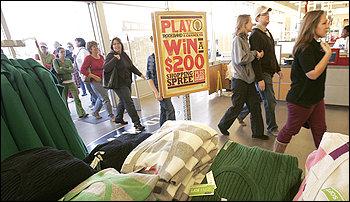 Consulting firm Accenture predicts that about 52 percent of American consumers plan to hit the stores on that day, up from 42 percent last year. By Sunday, 134 million people are likely to have gone shopping, according to the National Retail Federation, a trade group, up nearly 5 percent over last year.
Consulting firm Accenture predicts that about 52 percent of American consumers plan to hit the stores on that day, up from 42 percent last year. By Sunday, 134 million people are likely to have gone shopping, according to the National Retail Federation, a trade group, up nearly 5 percent over last year.
Traditionally, the day after Thanksgiving has been considered a pivotal juncture in the all-important holiday season. Retailers battle for the lowest prices on the hottest items -- from the $10 Zhu Zhu pet hamster toys to flat-panel TVs -- to stand out in shoppers' minds. A strong showing can help solidify a retailer's image as a shopping destination or merely a drive-by and is seen as crucial to building momentum to last through December. The popularization of the nickname Black Friday came about because the steep bargains and frenzied shopping traditionally mark the start of the season in which many retailers begin turning a profit -- or head into the black -- for the year.
But this year, that momentum may not last, said Pam Danziger, who heads retail consulting firm Unity Marketing. A big turnout may not be a sign of consumers' pent-up demand but rather their desire for a deal. Once those are gone, shoppers could easily shut their wallets.
"It's not about shopping to find gifts," she said. "It's about shopping to get really attractive discounts."
The marathon recession has made retailers' performance this holiday season even more significant. Consumer spending is the engine of the national economy, driving 70 percent of the gross domestic product. Many economists believe that without robust spending by shoppers during the holiday season -- kicked off by Black Friday -- the country's nascent recovery will peter out.
But consumers have set a high bar for retailers this year. They became accustomed to massive discounts during last year's holiday bloodbath, when many stores slashed prices by 70 percent or more as the economy crumbled. The Accenture survey found that 86 percent of shoppers won't buy anything without a 20 percent discount, while about a quarter said they won't bother with anything less than 50 percent off.
"We have seen a 'shift to thrift' across all income levels during this economic downturn and breaking that habit will be the greatest challenge for retailers this holiday season," Janet Hoffman, global managing director of retail for Accenture, said.
Discount stores such as Wal-Mart and Target ranked as the most popular shopping destinations, followed by department stores, according to Accenture. Only about 5 percent reported plans to hit luxury retailers.
But economist Paul Dales of Capital Economics cautioned against putting too much weight on Black Friday. The shopping spree may play an important psychological role for shoppers, but he said it is not a reliable indicator of overall holiday sales. In fact, it is not even typically the biggest sales day of the season. That distinction usually goes to the last Saturday before Christmas.
Looking back to 1992, Dales compared chain store sales during the week of Black Friday to those during November, December and January of the same years. Though the results were varied, Dales said the pattern suggested stronger Black Friday sales resulted in weaker performance overall. He posited that shoppers may have been spending more on Black Friday at the expense of the rest of the season.
"This simple analysis is hardly 100 percent waterproof," Dales wrote in a research note. "Nonetheless, it is a warning not to get too excited if Black Friday sales are reported to be strong or too downbeat if they are not."
Local boutique owner Anna Fuhrman, who runs Proper Topper, said Black Friday has never been a good indicator of the rest of the season during her two decades in retail. Instead, her sales typically build closer to Christmas. She said she has planned a few sales for the day but doesn't buy into the massive discounting of big box and mall-based retailers -- and neither do many of her customers.
"For most stores, the relevance is trying to live up to something that is created," Fuhrman said.
The International Council of Shopping Centers, a trade group, predicted a strong turnout for what it has dubbed Bargain Friday, with roughly 80 percent of shoppers hitting stores before noon. Though the group also said that the day's results could be misleading, it forecast retail sales to rise 0.9 percent in November and December from a year ago.
Even less scientific -- but certainly entertaining -- are the real-time Black Friday predictions on sports betting site Bookmaker.com. Chief executive Mickey Richardson compiled odds on how many shoppers will turn out and how much they'll spend.
Early this week, the safest bet was between 161 million and 180 million consumers shopping in stores and online. But news of the ongoing H1N1 scare helped boost odds that the day would see a smaller turnout of less than 130 million. Richardson said the average bet was between $50 to $100.
"The public definitely has an edge when we do things like this," Richardson said. "Everybody has an opinion about something."





